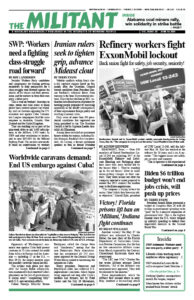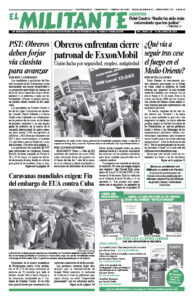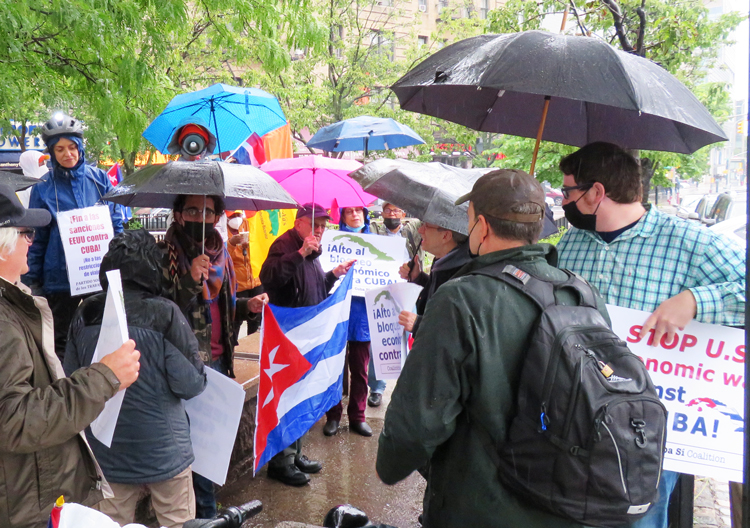Opponents of Washington’s economic war against Cuba held protest caravans in 70 cities around the world from Africa to Europe and the Americas — including 17 in the U.S. — May 29-30, the largest number since the monthly caravans began last fall.
The actions took place just days after the Joseph Biden administration announced it had renewed Cuba’s placement on the list of governments it claims aren’t “cooperating fully” with U.S. anti-terrorism efforts.
Cuban Foreign Minister Bruno Rodríguez called the charge false and “slanderous,” noting that the new Democratic Party administration has maintained all 243 measures imposed by the Donald Trump White House aimed at increasing the squeeze on Cuba.
Every president, Democrat and Republican alike, has enforced U.S. imperialism’s sanctions, which began being imposed not long after Cuba’s workers and farmers, led by Fidel Castro and the July 26 Movement, overthrew the Fulgencio Batista dictatorship in 1959. The sanctions are aimed at punishing the Cuban people for replacing capitalist exploitation and oppression with a revolutionary workers and farmers government, transforming the country and themselves, and carrying out the first socialist revolution in the Americas.
Next month’s caravans will take place June 20, prior to the June 23 vote at the United Nations General Assembly on an annual resolution calling on Washington to lift the embargo.
In Cuba, some 2,000 people in cars and trucks and on skates, motorcycles, bicycles and horseback caravanned through Ciego de Ávila in the center of the island May 30, with signs demanding an end to the embargo and waving Cuban flags, the largest of many actions there. Juventud Rebelde noted that despite anti-COVID-19 measures that discourage large crowds, there are times “when a country has to demonstrate that it will not surrender.”
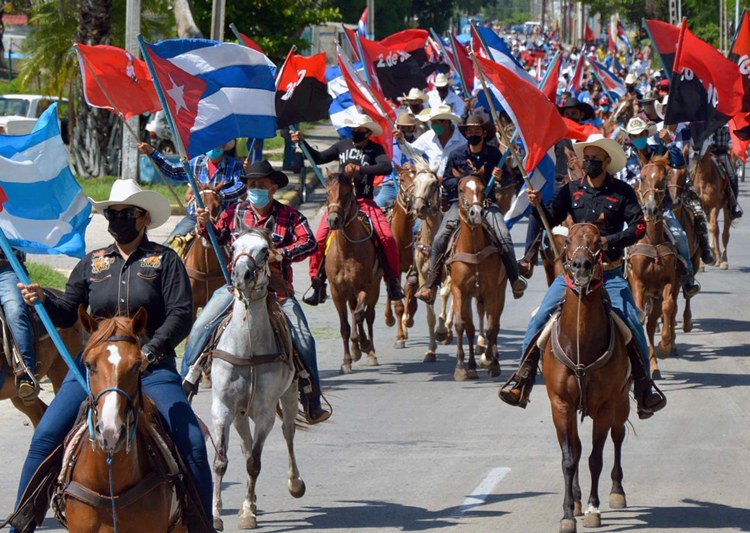
Below are reports on some of the May actions.
Miami action demands ‘Lift the sanctions’
BY STEVE WARSHELL
MIAMI —“President Biden — Keep your promises to the Cuban people: Restore family reunification, remittances, travel. End the blockade!” read the banner on the lead truck in the May 30 caravan here of more than 130 people in 100 cars and on 13 bicycles. Cars displayed signs saying: “No to the embargo! End the Cold War against Cuba,” “The Cuban family is sacred!” and “No to the travel ban!” The caravan was welcomed by many passersby.
Meeting at a Coral Gables park, the mostly Cuban American participants heard brief remarks by Carlos Lazo and Jorge Medina, leaders of Puentes de Amor (Bridges of Love), the group that initiated the worldwide caravans.
Donations were collected for the campaign to send hundreds of thousands of syringes to Cuba to aid in delivering vaccines developed there to protect people against COVID-19.
About 25 right-wing opponents of the Cuban Revolution protested across the street, but the disciplined caravan participants simply drowned out their provocative taunts. Before taking off on the route, Lazos led the caravanistas in singing La Bayamesa, the Cuban national anthem.
Another caravan was held in Tampa’s Cuban American neighborhood, drawing a dozen carloads of protesters.
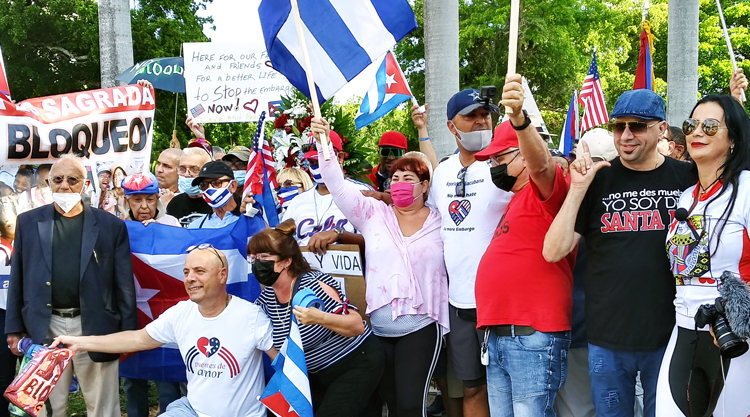
Embargo causes lack of medical supplies
BY DAN FEIN
CHICAGO — Some 50 people in over 30 cars wove their way through the Albany Park neighborhood here May 30 after a sidewalk rally at a nearby transportation hub. Many workers on the streets gave them a thumbs-up.
“The U.S. does not allow business relations and restricts travel to Cuba,” Carelia Drake, a Cuban American and leader of the Chicago Coalition in Solidarity with Latin America, told the rally. “The U.S. government fines other countries for doing business with Cuba. That has led to a need for syringes, masks and other materials to treat patients.”
Despite the embargo, Cuban volunteers provide medical aid in some 60 countries around the world, including helping combat COVID-19, Drake noted.
Washington carries out its economic attacks on Cuba, “because the Cuban people reject the capitalist system of the United States,” said Luis Carchi, a representative of the Ecuadoran group Patria Grande de Chicago.
Our message is ‘Cuba is not alone’
BY SETH GALINSKY
NEW YORK — Some 35 people joined a seven-car caravan through the predominantly Dominican Washington Heights neighborhood here.
“We want to send out the message that Cuba is not alone,” Rev. Luis Barrios told participants inside the Holyrood Episcopal Church-Iglesia Santa Cruz before the caravan headed out into a heavy rain.
In opposing the U.S. embargo, participants are not just defending Cuba, Barrios said. There is no better example of an alternative “to the capitalist society we are living in,” than the Cuban Revolution.
When the caravan arrived at Duarte Square the rain had eased and participants joined in a spirited rally with other protesters who had been waiting for the caravan.
“Enough already. Cuba has been confronting the U.S. empire for more than 60 years,” Bélgica González, from the Movimiento Patria Para Todos, a Dominican political party, told the crowd. “End the blockade of Cuba. And leave Venezuela alone as well.”
Stop the embargo’s harsh impact on Cuba’s people
BY JEFF POWERS
SAN FRANCISCO — Twenty vehicles joined a caravan through the Mission District and other neighborhoods here, carrying signs that said: “End the U.S. economic war against Cuba,” “U.S. out of Guantánamo” and “End travel restrictions to Cuba.”
Representatives from the Venceremos Brigade, Saving Lives Campaign, Party for Socialism and Liberation, Code Pink and the Socialist Workers Party spoke at a brief rally. Cuban journalist Arlene Rodríguez spoke via telephone from Havana, describing the harsh impact of the U.S. economic war.
New Zealand: ‘Solidarity needed more than ever’
BY JANET ROTH
AUCKLAND, New Zealand — Seventeen people in 11 cars joined the first caravan to take place here. With loudspeakers mounted in the lead car, the caravan wound through three shopping centers, passing out fact sheets and explaining the need to oppose the U.S. economic war on Cuba.
“The situation in Cuba is difficult today,” Luis Casares, originally from Cuba, told participants. “Solidarity is needed more than ever.”
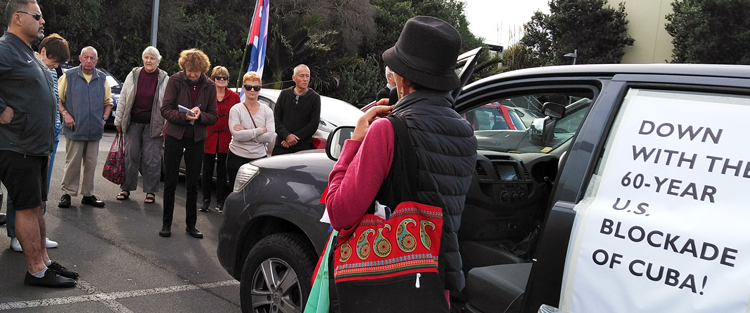
Some 50 people in 30 cars joined the caravan in Montreal, including a worker at a Cargill meatpacking plant who was at his first caravan. In Los Angeles, participants ended the caravan with a march around a busy intersection in the Inglewood suburb. The 30 participants in the caravan in Minneapolis were received with cheers and waves by working people at bus stops along the way. In Atlanta, 17 people in 10 cars joined the caravan. Nine cars took to the road in Albany, New York.
To find out more about the June 20 caravans, visit the National Network on Cuba at www.nnoc.info or contact the branch of the Socialist Workers Party or Communist League nearest you.
